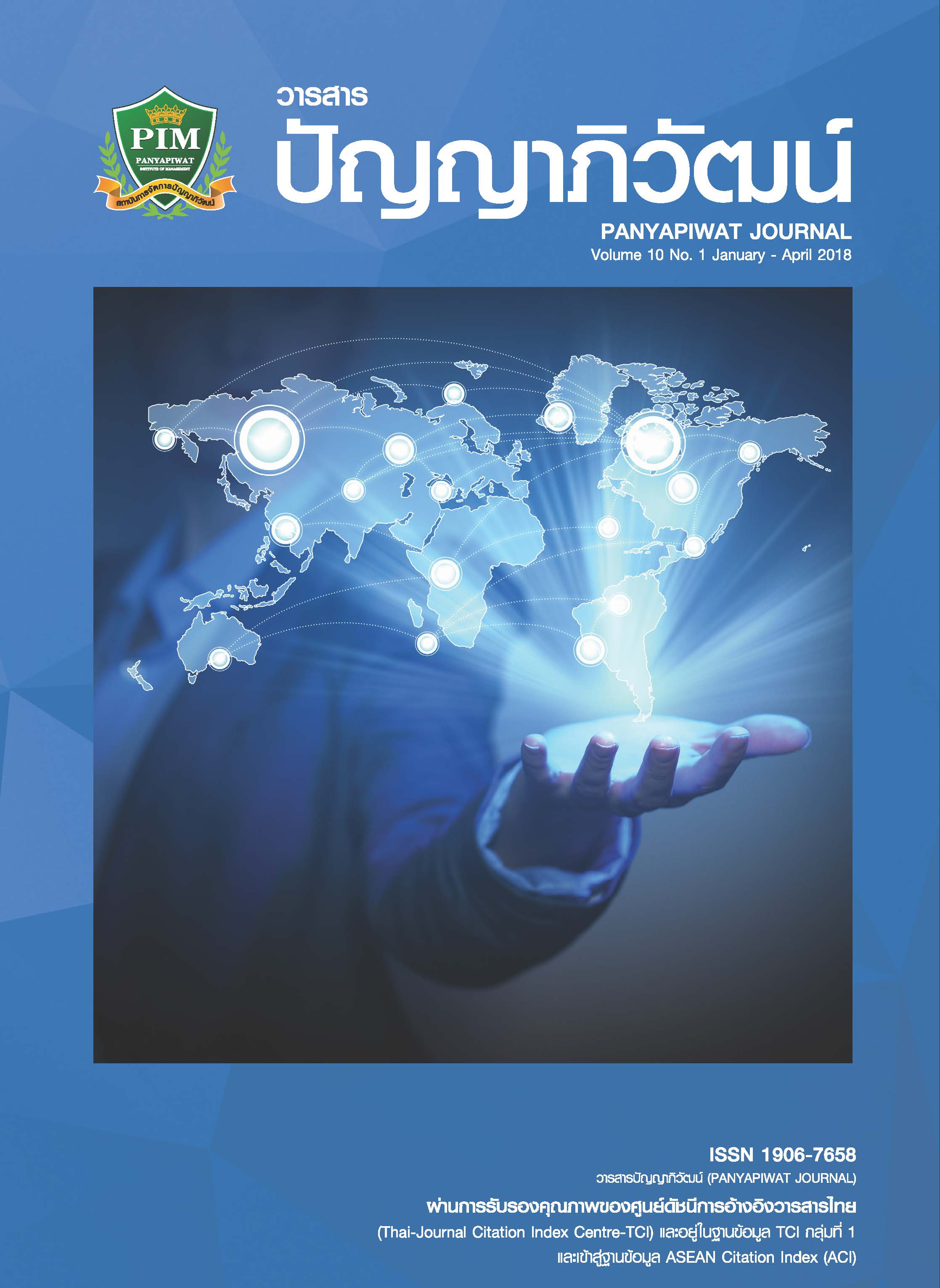ผลการสอนด้วยกิจกรรมโครงงานผู้นำกับจิตสาธารณะเพื่อการพัฒนาวิธีการสอนสำหรับนักศึกษากลุ่ม Generation Y
Main Article Content
บทคัดย่อ
การวิจัยครั้งนี้มีวัตถุประสงค์ดังนี้ 1) เปรียบเทียบผลสัมฤทธิ์ก่อนเรียนและหลังเรียนของนักศึกษากลุ่ม Generation Y ที่เรียนในรายวิชาภาวะผู้นำในสังคมยุคใหม่ 2) ศึกษาเจตคติของนักศึกษากลุ่ม Generation Y ที่เรียนในวิชาภาวะผู้นำในสังคมยุคใหม่ต่อกิจกรรมโครงงานผู้นำกับจิตสาธารณะ 3) พัฒนาวิธีการเรียนการสอนแบบใหม่ด้วยกิจกรรมโครงงานผู้นำกับจิตสาธารณะที่ตรงกับลักษณะของนักศึกษาที่เป็นกลุ่ม Generation Y
กลุ่มตัวอย่างเป็นนักศึกษาที่ลงทะเบียนเรียนวิชาภาวะผู้นำในสังคมยุคใหม่ ภาคเรียนที่ 1 ปีการศึกษา 2559 จำนวน 100 คน โดยเครื่องมือที่ใช้ในการวิจัยประกอบด้วย 1) แบบวัดผลสัมฤทธิ์ในการเรียนรายวิชาภาวะผู้นำในสังคมยุคใหม่คือ Pre Test และ Post Test 2) แบบวัดเจตคติของนักศึกษาต่อกิจกรรมโครงงานผู้นำกับจิตสาธารณะ สถิติที่ใช้ในการวิเคราะห์ข้อมูลคือ ค่าเฉลี่ย ส่วนเบี่ยงเบนมาตรฐาน และการทดสอบค่าที (t-test)
ผลการวิจัยพบว่า 1) ผลสัมฤทธิ์ทางการเรียนของนักศึกษาหลังเรียนมีค่าเฉลี่ยสูงกว่าก่อนเรียนวิชาภาวะผู้นำในสังคมยุคใหม่อย่างมีนัยสำคัญทางสถิติที่ระดับ 0.01 2) เจตคติของนักศึกษาต่อการเรียนด้วยโครงงานผู้นำกับจิตสาธารณะในทุกด้านอยู่ในระดับที่มากที่สุด โดยมีคะแนนค่าเจตคติด้านคุณธรรมและจริยธรรมมีค่าสูงสุด ส่วนรองลงมาคือ ด้านทักษะความสัมพันธ์ระหว่างบุคคลและความรับผิดชอบ ด้านความรู้ ด้านทักษะการสื่อสารและการใช้เทคโนโลยีสารสนเทศ และด้านปัญญา ตามลำดับ 3) รูปแบบการเรียนการสอนด้วยโครงงานผู้นำกับจิตสาธารณะสามารถพัฒนาจิตสาธารณะของนักศึกษาให้สูงขึ้นได้
ดังนั้นสรุปได้ว่า การสอนวิชาภาวะผู้นำในสังคมยุคใหม่ทำให้นักศึกษากลุ่ม Generation Y มีความรู้เกี่ยวกับภาวะผู้นำเพิ่มขึ้นและการสอนในวิชาภาวะผู้นำด้วยโครงงานผู้นำกับจิตสาธารณะสามารถพัฒนาภาวะผู้นำกับผู้เรียนได้ 5 ด้าน ประกอบด้วย 1. ด้านคุณธรรมและจริยธรรม 2. ด้านความรู้ 3. ทักษะทางปัญญา 4. ด้านทักษะความสัมพันธ์ระหว่างบุคคลและความรับผิดชอบ 5. ด้านทักษะการสื่อสารและการใช้เทคโนโลยีสารสนเทศได้อย่างมีประสิทธิภาพ
The purposes of this research were: 1) to compare the achievement of before and after study of Generation Y students in the course of Leadership of Modern Society. 2) to studied the attitude of Generation Y students, studying in the Project of Leadership Public-Mindedness Project. 3) to develop a new way of teaching and learning with Public-Mindedness Project Activities in line with the characteristics of Generation Y Students.
The sample was 100 students, studied in the course of Leadership of Modern Society in the first semester of the 2016 academic year. The instruments used in this research were: 1) The achievement test of Leadership of Modern Society in pretest and posttest. 2) The attitude test in Leadership with Public-Mindedness Project Activities developed by the researcher. 3) Statistics for data analysis was the mean, standard deviation, and t-test.
The research findings were as follow:
- After the students had learned the course of Leadership of Modern Society, it was found that the achievement was statistically significant higher at the 0.01 level.
- The students who learned through the Leadership with Public-Mindedness Project Activities had their attitude in all parts at the highest level. The attitude’s score of the rest parts were Ethics and Morals, Interpersonal Skills and Responsibility, Knowledge, Communication and Information Technology Skill, and Cognitive Skills respectively.
- Model of study in the course of Leader with Public-Mindedness Project Activities to Develop Teaching Methods can improve higher the public mind of students.
In conclusion, teaching in the Leader with Public-Mindedness Project Activities to Develop Teaching Methods and Leadership of Modern Society subject can improve Generation Y students in 5 parts of the public mind of students to higher level of efficiency. It was composed of 1. Ethics and Moral 2. Knowledge 3. Cognitive Skills 4. Interpersonal Skills and Responsibility 5. Communication and Information Technology Skill.
Article Details
“ข้าพเจ้าและผู้เขียนร่วม (ถ้ามี) ขอรับรองว่า บทความที่เสนอมานี้ยังไม่เคยได้รับการตีพิมพ์และไม่ได้อยู่ระหว่างกระบวนการพิจารณาลงตีพิมพ์ในวารสารหรือแหล่งเผยแพร่อื่นใด ข้าพเจ้าและผู้เขียนร่วมยอมรับหลักเกณฑ์การพิจารณาต้นฉบับ ทั้งยินยอมให้กองบรรณาธิการมีสิทธิ์พิจารณาและตรวจแก้ต้นฉบับได้ตามที่เห็นสมควร พร้อมนี้ขอมอบลิขสิทธิ์บทความที่ได้รับการตีพิมพ์ให้แก่สถาบันการจัดการปัญญาภิวัฒน์หากมีการฟ้องร้องเรื่องการละเมิดลิขสิทธิ์เกี่ยวกับภาพ กราฟ ข้อความส่วนใดส่วนหนึ่งและ/หรือข้อคิดเห็นที่ปรากฏในบทความข้าพเจ้าและผู้เขียนร่วมยินยอมรับผิดชอบแต่เพียงฝ่ายเดียว”
เอกสารอ้างอิง
Brand Buffet. (2014). 5 Features of Gen Y and 3 Strategies. Retrieved July 5, 2017, from https://www.brandbuffet.in.th/2014/11/how-to-attack-gen-y-scb-eic/ [in Thai]
Chankeiw, A. (2011). A Development of a Teaching Model to Enhance Public Mind of Mathayomsuksa 2 Students. Master Degree Thesis, Curriculum and Instruction Program, Faculty of Education, Mahasarakham University. [in Thai]
Cheannaimeang, P. (2011). The effects of using a guidance activities package based on the behaviorism theory on public mindedness behaviors of Mathayom Suksa II Students at Satri Rachinuthit School in Udon Thani Province. Master Degree Thesis, Faculty of Education, Sukhothai Thammathirat Open University. [in Thai]
Chongwisan, R. (2013). Leadership. Bangkok: Chulalongkorn University Press. [in Thai] Donsricha, R. (2011). The use of guidance activities to develop public mind of Mattayomsuksa 4 Students. Master Degree Thesis, Faculty of Education, Educational Psychology and Counseling, Khon Kaen University. [in Thai]
lamnirum, T., Wichitwanna, S. & Pankao, O. (2005). Development Research Methodology for Thesis. Nonthaburi: Sukhothai Thammathirat Open University Press. [in Thai]
Lussier, R. N. & Achua, C. F. (2007). Effective leadership (3. ed.). Nashville: South Western Publishing. McDonell, J. R. (2007). Neighborhood characteristics, parenting, and children's safety. Social Indicators Research, 83(1), 177-178.
Makkasman, W. (1996). The Development of Project Based Instructional Model for Enhancing Self-Esteem of Kindergarteners. Doctor Degree Thesis, Curriculum and Instruction Program, Faculty of Education, Chulalongkorn University. [in Thai]
Manning, G. & Curtis, K. (2009). The Art of Leadership. Singapore: McGraw-Hill.
Promsri, C. (2014). Contemporary Leadership. Bangkok: Panyachon Publishing. [in Thai]
Reilly, P. (2012). Understanding and Teaching Generation Y. English Teaching Forum. Ritcharoon, P. (2011). Research Methodology in Social Sciences. Bangkok: House of Kermyst. [in Thai]
Ritcharoon, P. (2016). Principles of measurement and evaluation. Bangkok: House of Kermyst. [in Thai]
Sawetworachot, T. (n.d.). Public Mind. Retrieved July 10, 2017, from http://taamkru.com/th/%E0%B8%88%E0%B8%B4%E0%B8%95%E0%B8%AA%E0%B8%B2%E0%B8%98%E0%B8%B2 %E0%B8%A3%E0%B8%93%E0%B8%B0/ [in Thai]
Seangprateeptong, W. (2011). Attitude: Concept and Measurement method. Educational Measurement and Evaluation, Faculty of Education, Sukhothai Thammathirat Open University. [in Thai]
Sripaiwong, P. (2013). Development of An Instructional Activity Using Project Based Learning Based on The Mini Company Model on The Subject Of Career Project for Mathayom Suksa 5. Master Degree Thesis, Faculty of Education, Educational, Curricuium andlntruction, Sakon Nakhon Rajabhat University. [in Thai]
Srithinon, S. (2011). The effects of using the project-based teaching method to teach the social studies course topic of environment conservation in Amphur Chiang Khong on learning achievement and public-mindedness of mathayom suksa V Students at Chiang Khong Wittayakom School in Chiang Rai Province. Master Degree Thesis, Curriculum and Instruction Program, Faculty of Education, Sukhothai Thammathirat Open University. [in Thai]
Yolao, D. et al. (2014). Learning Management by Project-Based Learning. Retrieved July 10, 2017, from https://candmbsri.wordpress.com/2015/04/08/%E0%B8%81%E0%B8%B2%E0%B8%A3 [in Thai]


